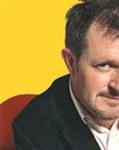Radio in South Africa is about to face its toughest challenge: to go where it dreads. Radio bosses looking to position their stations and secure any measure of leverage within the increasingly crowded media game need to realise that evolving consumer trends are pointing towards an area that most of them fear.
Pure force-of-people power
Respected trends analyst Dion Chang is passionate about what is going to influence trends in the near future. He explains that we're about to enter a period of exciting uncertainty. Trends are going to be determined not by institutions or leading figures, but by the pure force-of-people power.
So what does this mean for radio?
Briefly, it means that radio stations are going to have to hand over a little control to their audience, and they're finally going to have to embrace the fact that things need to be a little more deconstructed.
All this is a little scary for radio, because stations thrive on control. Time is money, or more accurately, airtime is money, so they need to manage it carefully, which means keeping programming tight and structured. Suggest that they need to loosen up and be a little more creative and they start getting a little panicky.
Voices of authority
Radio stations also enjoy their place as voices of authority in their communities and are a little nervous about sharing that position, even if it is with those same communities.
But share they must.
Chang points to a near future where we will move from an era of control to an era of community, and to a shift in value systems. In radio terms, this means inviting the community into the broadcasting sphere. With consumers now active creators of content and becoming, in Chang's words, "more demanding and more vocal about the service and quality levels they expect", radio stations need to recognise the call of their consumers and give them an increasingly relevant voice.
So how can they do this?
So how can they do this? When I work with radio teams, I explain the necessity for presenters to reposition themselves as 'social networking hubs'. In short, this means they are no longer the sole creators and presenters of content.
To borrow a mining term, they now have to be 'beneficiators' of content. Using social networking sites doesn't mean simply having a presence on them.
They have to monitor the 'chatter' from sites relevant to their audience; be sensitive to the moods underlying the chatter; then take the raw expressions and process them into more structured opinions that they then share with their audience, continually aware of the emotional triggers that will initiate reaction. They must then allow their audience an opportunity to express their reaction, either via phone or SMS [and surely Twitter? - managing ed].
Connect to and with
If radio stations are to be relevant in the future, they mustn't broadcast to their audience; they need to connect them, and connect with them. To do this, there are two words that radio bosses need to imbue into their programming philosophy: 'honesty' and 'authenticity'.
They need to understand that life isn't a carefully scripted and edited Hollywood movie. It's messy.
Essentially, radio stations need to get real. There are many ways this can be done, but they can start by losing the 'jockspeak' and by roughening up the edges of their imaging.
Jockspeak is the radio version of a telesales pitch. It's the delivery of a stream of rehearsed content including station IDs, station promotions and competitions complete with contact details, generally imbued with false enthusiasm. It's also littered with clichés such as "up for grabs" and "hottest hits". Jockspeak is not real, and in a consumer environment that demands honesty, it is irrelevant; therefore, any link full of jockspeak is a wasted opportunity to connect with the audience.
Lacks honesty
I also still hear radio stations employing super-slick formatted imaging that mirrors the standard fair found on thousands of radio stations in the US back in the late '90s: lots of tightly woven electro stings and wooshes, washing over a smoky male or female voice breathing the station's name and ID. It sounds plastic and false, as if it were churned out from some factory in China. It therefore lacks honesty and any measure of uniqueness.
Another problem with 'super-slick' is that it flies by too quickly and disappears into the background, which is the broadcast equivalent of a black hole. If a station wants to connect with those listening, it needs programming to remain foremost in the minds of the audience. This can be done by breaking format and experimenting with subliminal imaging.
Timbuk3 once sang, "The future's so bright, I gotta wear shades." If Chang is correct, and my gut feel tells me he's spot on, radio could have a bright future; but it has to get real. It has to realise it is no longer the determinant of opinion, but needs to be the hub filter of the opinion of its audience; and that being continually super-slick is just a great way to be plastic and artificial.
For more:



































